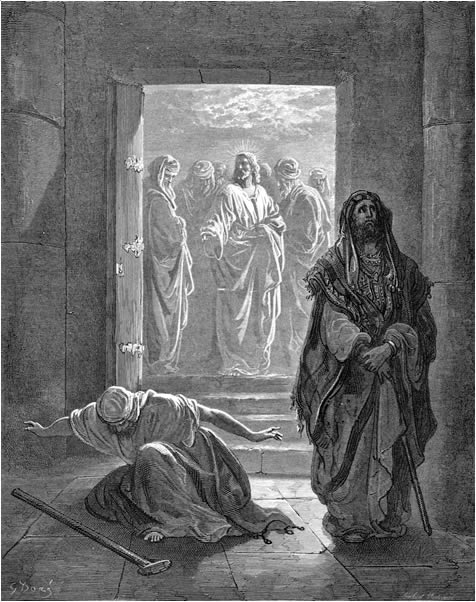今週も福音のヒントの箇所から学ぶ。今日の箇所は「年間第30主日(2025/10/26 ルカ18章9-14節)」。段落としての並行箇所はないが、14節の並行記事としてマタイ伝23:12がある。3年前の記事がある。
第一朗読 シラ35・15b-17, 20-22a
15主は裁く方であり、
人を偏り見られることはない。
16貧しいからといって主はえこひいきされないが、
虐げられている者の祈りを聞き入れられる。
17主はみなしごの願いを無視されず、
やもめの訴える苦情を顧みられる。
20御旨に従って主に仕える人は受け入れられ、
その祈りは雲にまで届く。
21謙虚な人の祈りは、雲を突き抜けて行き、
それが主に届くまで、彼は慰めを得ない。
彼は祈り続ける。いと高き方が彼を訪れ、
22正しい人々のために裁きをなし、
正義を行われるときまで。
第二朗読 二テモテ4・6-8, 16-18
6〔愛する者よ、〕わたし自身は、既にいけにえとして献げられています。世を去る時が近づきました。7わたしは、戦いを立派に戦い抜き、決められた道を走りとおし、信仰を守り抜きました。8今や、義の栄冠を受けるばかりです。正しい審判者である主が、かの日にそれをわたしに授けてくださるのです。しかし、わたしだけでなく、主が来られるのをひたすら待ち望む人には、だれにでも授けてくださいます。
16わたしの最初の弁明のときには、だれも助けてくれず、皆わたしを見捨てました。彼らにその責めが負わされませんように。17しかし、わたしを通して福音があまねく宣べ伝えられ、すべての民族がそれを聞くようになるために、主はわたしのそばにいて、力づけてくださいました。そして、わたしは獅子の口から救われました。18主はわたしをすべての悪い業から助け出し、天にある御自分の国へ救い入れてくださいます。主に栄光が世々限りなくありますように、アーメン。
福音朗読 ルカ18・9-14
9〔そのとき、〕自分は正しい人間だとうぬぼれて、他人を見下している人々に対しても、イエスは次のたとえを話された。10「二人の人が祈るために神殿に上った。一人はファリサイ派の人で、もう一人は徴税人だった。11ファリサイ派の人は立って、心の中でこのように祈った。『神様、わたしはほかの人たちのように、奪い取る者、不正な者、姦通を犯す者でなく、また、この徴税人のような者でもないことを感謝します。12わたしは週に二度断食し、全収入の十分の一を献げています。』13ところが、徴税人は遠くに立って、目を天に上げようともせず、胸を打ちながら言った。『神様、罪人のわたしを憐れんでください。』14言っておくが、義とされて家に帰ったのは、この人であって、あのファリサイ派の人ではない。だれでも高ぶる者は低くされ、へりくだる者は高められる。」
改めて福音朗読を読むと「自分は正しい人間だとうぬぼれて、他人を見下している人々」は私のことだなあと思う。もちろん、それではいけないと思っているが、気がつけていないことは多い。
福音のヒント(2)には、「「人が義とされる」は「人が神の義にあずかる」こと、もっと分かりやすく言えば「神に受け入れられる」ということ」と書かれている。その考えに異論はないが、どうもイエスが14節の発言をしたかについてはしっくりこない。
3年前に私は14節に関連して「宗教的に考えると義とされる価値は極めて大きいが、私はイエスがそこにこだわっている気がしない。」と書いている。今も意見は変わっていない。「へりくだる者は高められる」という発言に違和感がある。教会組織に固有な説教臭さがにおうからだ。自分を正当化しても得るものはないが、それを説教にすると自由が奪われる。わかりやすく、心に響くので、これはこれで良いのだろうが、本当にこの通りに言ったとは私には思い難い。
biblehubのギリシャ語でマタイ伝23:12とルカ伝18:14を見ると共通点は多い。
For
δὲ (de)
Conjunction
Strong's 1161: A primary particle; but, and, etc.
whoever
Ὅστις (Hostis)
Personal / Relative Pronoun - Nominative Masculine Singular
Strong's 3748: Whosoever, whichsoever, whatsoever.
exalts
ὑψώσει (hypsōsei)
Verb - Future Indicative Active - 3rd Person Singular
Strong's 5312: (a) I raise on high, lift up, (b) I exalt, set on high. From hupsos; to elevate.
himself
ἑαυτὸν (heauton)
Reflexive Pronoun - Accusative Masculine 3rd Person Singular
Strong's 1438: Himself, herself, itself.
will be humbled,
ταπεινωθήσεται (tapeinōthēsetai)
Verb - Future Indicative Passive - 3rd Person Singular
Strong's 5013: To make or bring low, humble, humiliate; pass: To be humbled. From tapeinos; to depress; figuratively, to humiliate.
and
καὶ (kai)
Conjunction
Strong's 2532: And, even, also, namely.
whoever
ὅστις (hostis)
Personal / Relative Pronoun - Nominative Masculine Singular
Strong's 3748: Whosoever, whichsoever, whatsoever.
humbles
ταπεινώσει (tapeinōsei)
Verb - Future Indicative Active - 3rd Person Singular
Strong's 5013: To make or bring low, humble, humiliate; pass: To be humbled. From tapeinos; to depress; figuratively, to humiliate.
himself
ἑαυτὸν (heauton)
Reflexive Pronoun - Accusative Masculine 3rd Person Singular
Strong's 1438: Himself, herself, itself.
will be exalted.
ὑψωθήσεται (hypsōthēsetai)
Verb - Future Indicative Passive - 3rd Person Singular
Strong's 5312: (a) I raise on high, lift up, (b) I exalt, set on high. From hupsos; to elevate.
I tell
λέγω (legō)
Verb - Present Indicative Active - 1st Person Singular
Strong's 3004: (a) I say, speak; I mean, mention, tell, (b) I call, name, especially in the pass., (c) I tell, command.
you,
ὑμῖν (hymin)
Personal / Possessive Pronoun - Dative 2nd Person Plural
Strong's 4771: You. The person pronoun of the second person singular; thou.
this [man],
οὗτος (houtos)
Demonstrative Pronoun - Nominative Masculine Singular
Strong's 3778: This; he, she, it.
rather than
παρ’ (par’)
Preposition
Strong's 3844: Gen: from; dat: beside, in the presence of; acc: alongside of.
[the Pharisee],
ἐκεῖνον (ekeinon)
Demonstrative Pronoun - Accusative Masculine Singular
Strong's 1565: That, that one there, yonder. From ekei; that one (neuter) thing); often intensified by the article prefixed.
went home
κατέβη (katebē)
Verb - Aorist Indicative Active - 3rd Person Singular
Strong's 2597: To go down, come down, either from the sky or from higher land, descend. From kata and the base of basis; to descend.
justified.
δεδικαιωμένος (dedikaiōmenos)
Verb - Perfect Participle Middle or Passive - Nominative Masculine Singular
Strong's 1344: From dikaios; to render just or innocent.
For
ὅτι (hoti)
Conjunction
Strong's 3754: Neuter of hostis as conjunction; demonstrative, that; causative, because.
everyone
πᾶς (pas)
Adjective - Nominative Masculine Singular
Strong's 3956: All, the whole, every kind of. Including all the forms of declension; apparently a primary word; all, any, every, the whole.
who
ὁ (ho)
Article - Nominative Masculine Singular
Strong's 3588: The, the definite article. Including the feminine he, and the neuter to in all their inflections; the definite article; the.
exalts
ὑψῶν (hypsōn)
Verb - Present Participle Active - Nominative Masculine Singular
Strong's 5312: (a) I raise on high, lift up, (b) I exalt, set on high. From hupsos; to elevate.
himself
ἑαυτὸν (heauton)
Reflexive Pronoun - Accusative Masculine 3rd Person Singular
Strong's 1438: Himself, herself, itself.
will be humbled,
ταπεινωθήσεται (tapeinōthēsetai)
Verb - Future Indicative Passive - 3rd Person Singular
Strong's 5013: To make or bring low, humble, humiliate; pass: To be humbled. From tapeinos; to depress; figuratively, to humiliate.
but
δὲ (de)
Conjunction
Strong's 1161: A primary particle; but, and, etc.
the [one who]
ὁ (ho)
Article - Nominative Masculine Singular
Strong's 3588: The, the definite article. Including the feminine he, and the neuter to in all their inflections; the definite article; the.
humbles
ταπεινῶν (tapeinōn)
Verb - Present Participle Active - Nominative Masculine Singular
Strong's 5013: To make or bring low, humble, humiliate; pass: To be humbled. From tapeinos; to depress; figuratively, to humiliate.
himself
ἑαυτὸν (heauton)
Reflexive Pronoun - Accusative Masculine 3rd Person Singular
Strong's 1438: Himself, herself, itself.
will be exalted.”
ὑψωθήσεται (hypsōthēsetai)
Verb - Future Indicative Passive - 3rd Person Singular
Strong's 5312: (a) I raise on high, lift up, (b) I exalt, set on high. From hupsos; to elevate.
多少違いはあるが、ルカがマタイを引用したか、共通の参照文献のQ資料と呼ばれるような資料を引用した可能性は高いと思う。ただ福音のヒントで触れられている義とされるという言葉(δεδικαιωμένος (dedikaiōmenos))はマタイ伝の並行箇所では出てこない。またこの言葉はマルコ伝、ヨハネ伝では使われていない。パウロ書簡では何度も出てくる。
教会(倫理)への疑念を抱かせられる箇所であるが、福音のヒント(3)の脱「比較と競争」の理念に関しては共感する。
いずれにしても、自制は必要だ。
第一朗読も第二朗読も義に関わる箇所だ。テモテへの手紙二はパウロの牧会書簡で、教会形成、教会生活の規範を示している。シラ書もユダヤ教の集会生活の規範を示したもので、パウロの時代の教会で読まれていた文書だろう。社会を安全で安定的に維持するには律法や規範は必要だが、そこに比較は持ち込むべきではないのだと思う。あくまで神と個との関係で、義とされるかどうかは決まる。この箇所のファリサイ派の人は、きちんとした人だったのだろうし、相対的に良い位置にいると考えるのもおかしくはない。しかし、上を見れば、神と対峙すれば、望ましい姿を100とすれば、絶対評価で及第点を取れる人はいない。神の視点で見れば、みな至らないものであり、相対的評価など意味を持たない。
御国が来ますようにという祈りは、自分が救われることへの祈りではなく、民が共に御国に入っていることを願うことだ。人をばかにすることではなく、共に救われるために何をするのかが問われるのである。
※画像はGustave Dore - The Pharisee and the publican.画像で見ると、仮に着飾っていたとしても人間は人間に過ぎないと感じられてくる。努力を否定するものではないが、たまたま2つの立ち位置になっただけで、鳥瞰すれば差など無いに等しい。
